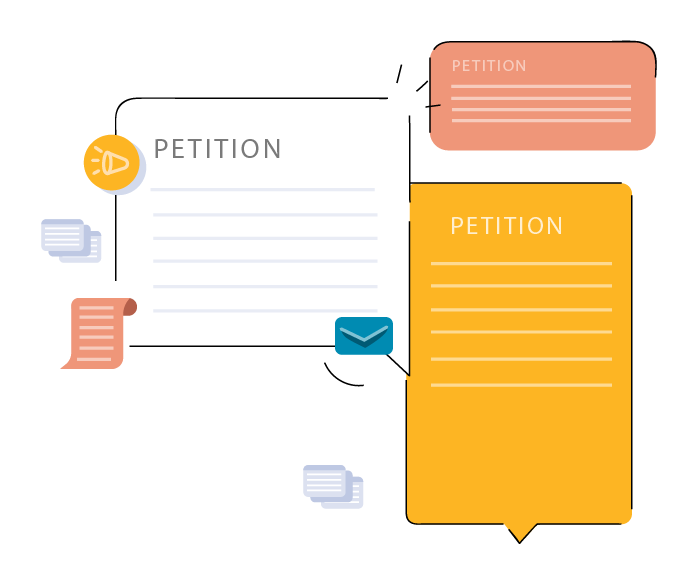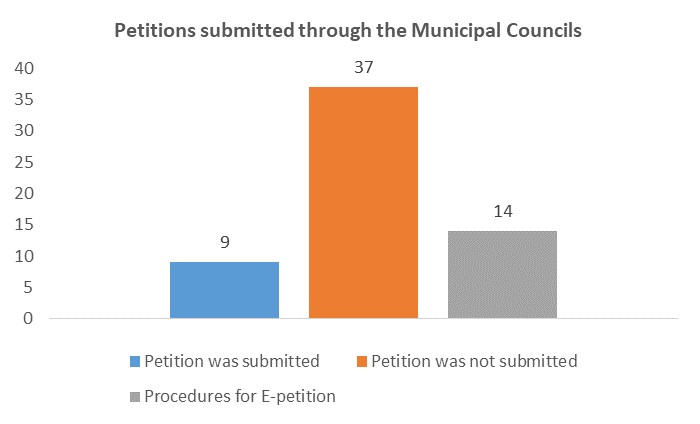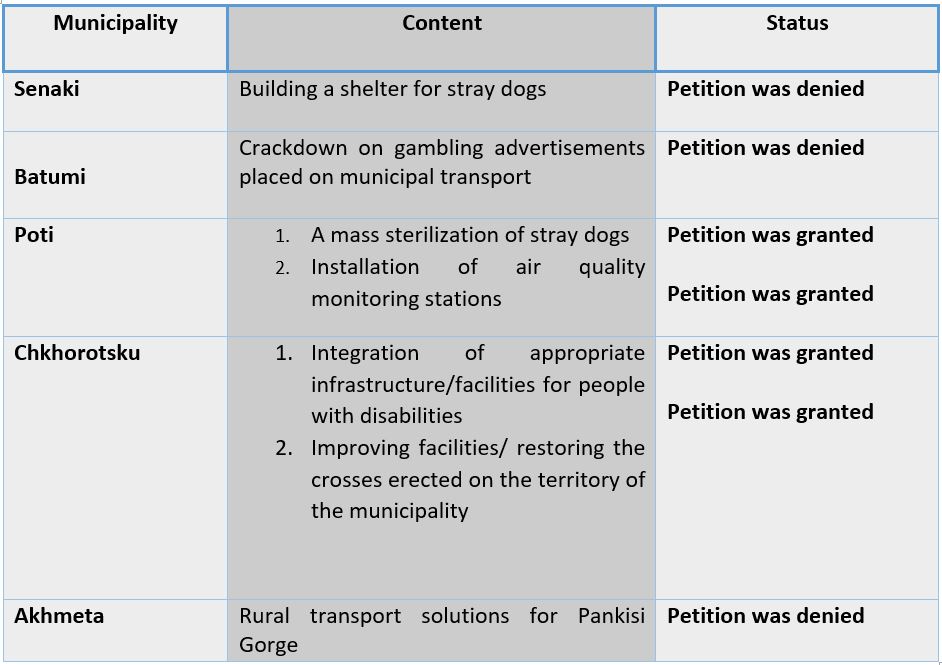


 Ensuring citizen participation in the decision-making process is the bedrock on which democracy rests. The development of technologies and innovations made this component highly correlate with the improvement of digital communications, especially when Covid-19 pandemic impacted the cardinal principle of public delivery and demonstrated the crucial importance of digital services.
Ensuring citizen participation in the decision-making process is the bedrock on which democracy rests. The development of technologies and innovations made this component highly correlate with the improvement of digital communications, especially when Covid-19 pandemic impacted the cardinal principle of public delivery and demonstrated the crucial importance of digital services.
Bearing in mind the lack of public engagement and inefficient tools for accountability, the e-petition system is vitally important for meeting the needs of the citizens so they are meaningfully involved in setting priorities by mass mobilization around a certain issue. On the one hand, the existence of petitions allows decision-makers to act in accordance with the initiatives proposed by the public, and on the other hand, citizens are given opportunity to actively participate in the decision-making process.
Strengthening citizen participation mechanisms for the sake of building transparency and accountability is one of the core principles of the Open Government Partnership (OGP). OGP endorses the use of technologies and innovations in any tool, including e-petitions, with the aim of enhancing civic engagement in public policy.
It should be stressed that launching electronic platform for e-petitions in Georgia was encouraged by a commitment under the country’s second Open Government Partnership Action Plan. The Institute for Development of Freedom of Information (IDFI), along with other partners, has made a significant contribution to its implementation.
IDFI’s advocacy campaign around the citizen participation portal launched back in 2012. The government approved the idea and made a commitment for the introduction of a citizen portal - ichange.ge - within the framework of the country’s first Open Government Partnership (OGP) Action Plan. The platform, however, was not launched within the planned deadline and the commitment was moved to the next OGP Action Plan (2014-2015). Later on, the process was supported by the United States Agency for International Development in the framework of the project Good Governance Initiative (GGI) in Georgia (USAID GGI). An Electronic Petition Platform – ICHANGE.GOV.GE – was officially launched in 2017.
The introduction of a petition system was also a commitment of the Tbilisi City Hall within the scope of the 2017 OGP Action Plan. The commitment was originally proposed by IDFI. Unfortunately, the system was not launched within the planned deadline either, although the City Hall developed the web portal “Your Idea for the City Mayor”, which is now successfully operating within the united web portal of municipalities – www.idea.municipal.gov.ge.
Furthermore, following IDFI’s recommendation, the Parliament of Georgia has developed the electronic platform for citizen participation in legislative work. Through the website of the Parliament of Georgia, citizens have the legal opportunity to collect e-signatures for supporting draft laws or addressing the chairman of the Parliament of Georgia.
The right to petition has been declared one of the fundamental rights of citizens across the globe. Apart from specific countries, a petition system is established at the levels of international organizations, including the European Union. The EU Petitions Web Portal guarantees any citizen of the EU, or resident in a Member State, as well as a legal person with its registered office in a European Union Member State, the opportunity to submit a petition to the European Parliament.
According to the UK petition practice, at 10,000 signatures, a petition gets a response from the government, and 100,000 signatures will be grounds for consideration for a debate in the Parliament. Up to this point, 339 petitions have received a response from the Government. These petitions are accessible on the web portal.
A petition has to reach at least 100,000 signatures within 30 days to receive an official response from the Government of the United States. Additionally, the petition must accrue 150 signatures within 30 days in order to be searchable on the web portal (We the People). Within 60 calendar days, the White House responds to every petition presented with 100,000 signatures.[1] The US petition system has been associated with a wide range of famous cases. For instance, after the acquittal of George Zimmerman, a neighborhood watch captain who fatally shot an African-American teen Trayvon Martin, an online petition calling for a full investigation and prosecution garnered 2.2 million signatures. There was extensive media coverage surrounding the Zimmerman’s case. Furthermore, on this basis, the worldwide movement “Black Lives Matter” was formed.
The practice of German Federal Republic is also noteworthy. The Government web portal contains a special section (Petitions-Forum) for initiators to get conversations going. The forum section attempts to attract a wider audience, allowing registered users to comment. At least 50,000 signatures are required for the special petition committee to discuss the initiative publicly, where the authors of the petition can present their own ideas in person. Apart from the opportunity to submit e-petitions, the German Bundestag web portal encourages interaction among citizens and members of the committee responsible for the introduction of the initiatives/ideas voiced by the citizens, regardless of whether it met the threshold.
Returning to the context of Georgian practice, an online platform www.ichange.gov.ge enables every citizen of Georgia to initiate e-petitions on the issues within the competencies of the Government, and any adult citizens of Georgia are eligible to vote. If the signature threshold is met within 30 days, it will be considered by the Expert Commission set up in the Government Administration. The special Commission decides whether to put a petition forward for a Government meeting. The threshold was initially set at 10,000 signatures. However, in accordance with the Ordinance of the Government of Georgia, from January 1, 2021, it was decreased to 5,000 signatures. It is also worth noting that IDFI advocated to set at 5,000 signatures right at the beginning, but the suggestion was not considered. Nevertheless, IDFI welcomes the latter decision by the Government and hopes that it will be a step forward in enhancing the interest towards the citizen platform as well as the number of initiatives.
Only one of the petitions submitted through the Government portal reached the required number of signatures until now, thus it was the only case that the special commission was obligated to consider. This circumstance refers to an urgent need from the Government on raising public awareness around civic engagement mechanisms. For instance, using social media, as well as banner advertising through the Government websites, can be a very powerful way to keep the public engaged, as well as to raise awareness around the E-petition platform. Unfortunately, the last post updated through the official Facebook page of the petitions is dated July 19, 2018. In addition to this, government websites have not placed any banner ads around the portal www.ichange.gov.ge.
It should be stressed that since the launch of www.ichange.gov.ge (December 22, 2017), the Expert Commission has not delivered any report on citizen-proposed initiatives or its activities. Only following statistical infographics are available on the portal.
In most cases petitions are simply denied due to its incompatibility with the competencies of the Government of Georgia. Another common reason for rejection at this stage include: repeated/duplicate petitions, petitions without a clear statement and/or containing inappropriate content. A very small number falls into the category of initiatives that are contrary to the law of Georgia.
Georgian citizens are most likely to initiate petitions pertaining to social issues. A relatively small number of petitions fall on the issues of education, finance, security, regional development, and the economy. The smallest number of initiatives touch on the topics of innovation, science, foreign policy, energy, culture, and sports.
The Local Self-Government Code of Georgia focuses on different forms of citizen participation in the decision-making process at the local level, including a general Assembly of a settlement, a petition, council of civil advisors, participation in the sessions of the municipal councils (Sakrebulo), and the opportunity of hearing reports on the work performed by the Mayor of the municipality and by a member of the municipal council. Apart from that, municipal high-ranking officials are obligated to regularly hold open meetings with the public.
The right to petition is one of the key tools to keep the public engaged. It also should be stressed that use of petitions at the local level was implemented much earlier than at the state level. According to the Local Self-Government Code, a petition may be filed by at least 1% of the constituents registered in the territory of a municipality, as well as the General Assembly. The following documents may be submitted in the form of a petition:
- a draft normative administrative-legal act;
- basic principles or specific proposals of a draft normative administrative-legal act that is to be prepared;
- based on problems common to a municipality and/or to a settlement, a request for the examination, discussion and solution of respective issues at a session of the Municipal Council.
It should be emphasized that the Code does not specify the procedure for submitting a petition electronically; however, taking into account the provisions of the relevant article, it enables municipal councils to determine their own procedures for submitting a petition electronically, through a resolution of the municipal council. For example, the Ozurgeti Municipal Council has adopted a resolution determining the number of valid signatures at 0.5% of the constituents registered in the territory of a municipality, in case of submitting a draft normative administrative-legal act electronically.
The Institute for Development of Freedom of Information has taken an interest in the number of petitions submitted and discussed throughout the municipal bodies across the country, in 2019-2020, as well as their contents. Requested information was provided by a total of 54 out of 64 municipal councils during the study period. An important consideration is that the Covid-19 pandemic had a negative impact on the timeliness and completeness of the responses. According to data provided by municipal councils, petitions for a vote were submitted in 9 out of 53 councils in 2019-2020. In the case of 7 municipalities, the petitions were submitted via printed forms. In case of Batumi and Ozurgeti Municipalities, petitions were submitted through the official website of the council. Furthermore, according to the current information, the procedure for submitting a petition electronically is determined by 14 municipalities, which highlights the lack of incentives for e-participation mechanisms at the local self-government level.

According to the data obtained within the period covered by the study, 25 petitions were registered in the 9 municipalities:13 in Ozurgeti, 2 in Chkhorotsku, 2 in Batumi, 2 in Poti, 2 in Tsalenjikha, 1 in Dusheti, 1 in Akhmeta, 1 in Keda, and 1 in Chokhatauri.
Some other notable trends in data are related to the contents. Petitions pertaining to infrastructural/organizational issues are relatively common at the local level, while no cases of submitting basic principles and/or specific proposals of a draft normative administrative-legal act were revealed during studied period. The following are some examples from the municipalities:
- Citizens called for Chkhorotsku Municipality Council to discuss the integration of appropriate infrastructure/facilities for people with disabilities.
- A petition was submitted to the Akhmeta Municipality Council regarding the rural transport solutions for Pankisi Gorge.
- Residents of Tsalenjikha Municipality Council submitted petition regarding the installation of a bus waiting area.
- The population of Poti Municipality addressed the need for a mass sterilization of stray dogs.
- The population of Batumi was concerned over gambling advertisements placed on municipal transport.
According to data, petitions were granted in seven cases. Two of them were denied due to a lack of funding, while others are still being discussed at the Government/Municipal Commission and/or the City Hall levels.
According to the Local Self-Government Code, a petition can be submitted to the Mayor of the municipality for discussion. IDFI has also taken an interest in the decisions of the bureau of a municipality Sakrebulo in the period of 2019-2020 and therefore requested information about the petitions submitted to the Mayor. The organization received 47 of responses out of 64 total requests. The data revealed that, by decision of the bureau of a municipality Sakrebulo, petitions were submitted to the following six City Halls - Batumi, Senaki, Poti, Ozurgeti,[2] Akhmeta, and Chkhorotsku.

Petitions were denied due to a lack of funding in the cases of the Senaki and Akhmeta City Halls. The petition addressing the need for a crackdown on gambling ads placed over municipal transport was not considered as a rational proposal by the City Hall of Batumi, as it would negatively impact the municipal budget. The noteworthy cases were the petitions (4 petitions in total) prepared by the residents of Poti and Chkhorotsku municipalities, which were fully satisfied.
Since 2018, the online submission tool for citizen participation has been launched at the level of city halls as well. The electronic portal – “Your Idea for the City Mayor” – currently includes up to 10 city halls. The portal is aimed at engaging citizens by allowing them to submit their initiatives online. At the first stage, the proposed idea is discussed by the site administration, and if any problems are identified, the initiator is given 15 days to adjust their petition to meet the required standards. At the second stage, the proposal has to reach at least 2,500 signatures within 60 days to be submitted to the relevant structural unit, territorial administration, or legal entity managed by the city hall in order to gain required resources for its successful implementation. At the final stage, the initiative will be submitted to the Mayor for consideration, after which the author will be provided with explanatory feedback, and it will also be published to the website.
Since its launch, three ideas have already been granted by the City Hall of Tbilisi Municipality. 21 more ideas that gathered the required number of signatures are being considered by the city government. The fact that citizens have not submitted any initiatives in all the other cases (9 municipalities) indicates a need for large-scale public campaigns to promote the use of the electronic portal.
Despite the creation of a petition system as a participatory mechanism at the legislative level, over the past years, practice has shown that it failed to generate a meaningful change due to various circumstances, and the citizens have not been using is as actively as they could to address a wide range of topics. First, it is crucial for the minimum threshold of signatures to be low enough to motivate citizens to be involved, while a higher threshold would have a negative impact on citizens’ expectations and lower their motivation. Transparency and accountability of government institutions are also significant factors, and it is vital to implement proactive disclosure of information regarding approved or denied petitions, explanatory feedbacks, as well as the oversight of the whole process and scrutiny by relevant agencies, which is a step forward in maintaining and building trust of the citizens in the petition system.
Awareness-raising and information campaigns on participatory mechanisms on a large scale, including right to petition, are also urgent, vis-a-vis cooperation among public, private, and civil sectors, as well as the involvement of high-ranking central and local government officials.
The use of petitions as one of the unique participatory mechanisms will have a huge impact on strengthening civic engagement in public policy. As mentioned previously, a successful petition can have the dual impact of enabling decision-makers to take measures that are in public interest while giving citizens the opportunity to participate in the decision-making process.
- Promoting a large-scale awareness-raising campaigns on petitions at the central and local levels;
- Review existing legislation pertaining to petitions, improve transparency and accountability standards (e.g., proactive disclosure of information regarding registered or closed petitions);
- Create an online discussion space for citizens on the official portals (e.g. a forum, Q&A, consultation or comment section), to make the platforms even more dynamic and efficient. This recommendation should also be considered among the municipalities that are implementing online petition systems at the moment;
- Annual reports on citizen-proposed initiatives, as well as activities of the relevant government institutions, need to be prepared and published;
- Encourage the submission of e-petitions at the local level, set a reasonable threshold for signatures, and implement a simple and affordable signing process. Additionally, it is vital to promote information campaigns on the latest system on a large scale, as well as proactively disclose information regarding approved, denied, or closed petitions on the portal.
_____
[1]According to publicly available data (as for 2016) over the five-year time period of its launching, the White House has officially responded to 227 petitions
[2]According to the data provided by Ozurgeti Municipal Council, 10 out of the 13 petitions were submitted to the mayor for discussion, although the outcomes are still unknown to IDFI. One, out of the three remaining, failed to gather the required number of votes, and two of them are being discussed to the Municipal Council.

This material has been financed by the Swedish International Development Cooperation Agency, Sida. Responsibility for the content rests entirely with the creator. Sida does not necessarily share the expressed views and interpretations.